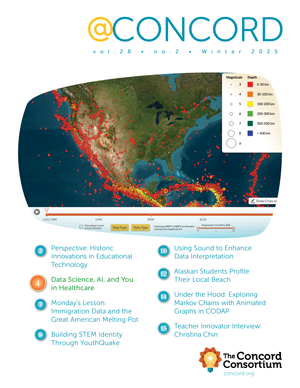News at Concord Consortium
Data science research conference
K-12 data science education is a crucial and growing education research field. However, as practitioners move quickly forward, there is little research-based guidance about what learners need to know and be able to do with data, and when, within the course of their learning, these skills and competencies are appropriate. With funding from the National Science Foundation and the Valhalla Foundation, the Concord Consortium is proud to host a conference of 30 diverse researchers, educators, data scientists, policymakers, curriculum developers and more to develop a research-based framework for learning progressions in data science education. The conference committee is seeking broad input to help review and refine the framework into formats valuable for the field. For more information or to volunteer, contact Kate Miller (kmiller@concord.org).
New project brings geoscience practices to middle school students
Earthquakes can wreak havoc on infrastructure, cause casualties, and disrupt vital services.To identify vulnerable communities and assess earthquake likelihood and impacts, computational geoscientists use sophisticated instruments such as remote sensing satellites, land stations, and seismic and GPS stations to collect and analyze large-scale seismic, geographical, and socioeconomic datasets. As data from these instruments become more robust and computers become more powerful, the rise of computational practices in geoscience research and careers is also accelerating.
Our new National Science Foundation-fundedYouthQuake project aims to bring this important work to middle school students in an urban California district.We are partnering with the EarthScope Consortium, the San Joaquin County Office of Education FabLab, and the University of South Florida to design a curriculum for students to engage in authentic science practices and explore earthquake hazards, risks, and preparedness in the context of their own communities.
YouthQuake is developing materials that are situated in the community context as students explore their neighborhood’s likelihood of experiencing a damaging earthquake and related preparedness, investigate GPS data and use computational models of land motion along the faults around their community, and create computational visualizations of earthquake hazard maps. Project research is studying how students engage in authentic computational geoscience investigations of earthquake hazards and whether these activities increase their interest in, and identity with, computational geoscience careers.
Partnering for environmental literacy
We are delighted to partner with Ten Strands to create environmental literacy curriculum units for K-12. The Concord Consortium is providing resources and support to the middle and high school curriculum writing teams. Our goal is to help students build habits of mind around data and engage in modeling, which are critical skills for understanding and developing solutions for complex problems.
Data collection and exploration is a cornerstone of each curriculum unit. Students use CODAP to examine data from atmospheric sensors across the state of California and explore inequities regarding the environmental impact of air quality on different populations; investigate Census data for impacts of different environmental characteristics on different racial and ethnic populations found in California; and study data on subsidence (decreasing altitudes) of land in the Central Valley as a result of ground water extraction for agriculture.
Each curriculum unit also incorporates a key modeling activity. While examining how climate change is causing the electricity to go out more often, students could express their understanding of the links between climate change and power by building a system model in SageModeler. Students are also studying the dynamics of water flow into and out of aquifers used to support agriculture. By experimenting with different water policies and environmental circumstances, they can see how projections into the future of water availability might be adjusted to promote sustainability. Through these and other activities, students are learning to become stewards of the local and global environment.
This material is based upon work supported by the Valhalla Foundation, Ten Strands, and the National Science Foundation under Grant Nos. DRL-2325871 and DRL-2241021. Any opinions, findings, and conclusions or recommendations expressed in this material are those of the author(s) and do not necessarily reflect the views of the funders.
